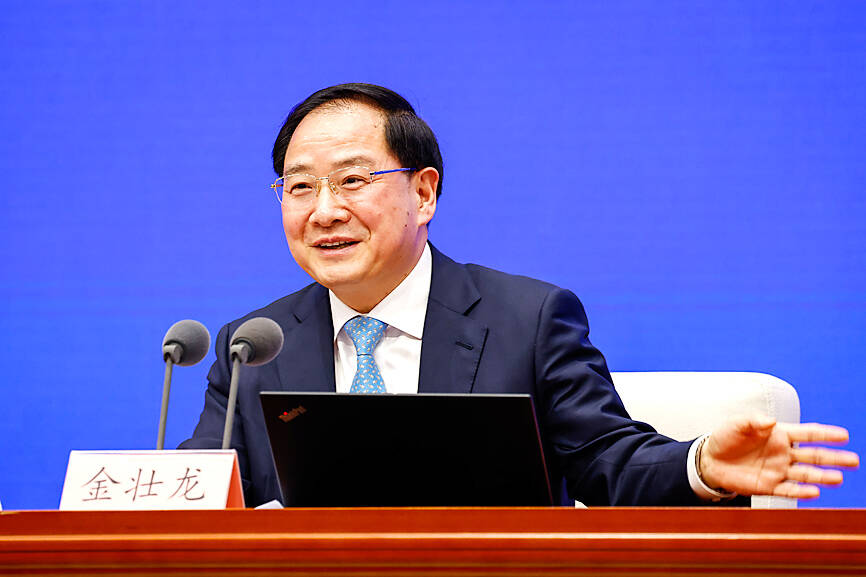China has assigned a new head to a high-profile, state-backed chip investment fund amid a renewed push to pour resources into the local semiconductor industry and counter a US-led blockade of the country’s technological development.
Zhang Xin (張新) is to become president of the National Integrated Circuit Industry Investment Fund Co (國家集成電路投資基金), popularly known as the Big Fund, Chinese corporate data service provider Tianyancha (天眼查) said.
Zhang was previously a mid-ranking official from the Chinese Ministry of Industry and Information Technology, Chinese news outlet Caixin said.

Photo: EPA-EFE
The Big Fund was tarnished by an anti-graft probe last year, which led to the downfall of its previous chief and several other officials.
Top Chinese leaders ordered investigations after they grew frustrated with a lack of breakthrough in developing semiconductors to replace foreign imports after years of ample government investments, at a time when the US and its allies are tightening restrictions on China’s access to critical technologies.
The secretive Big Fund is Beijing’s primary vehicle for doling out capital to the country’s chipmakers. Founded in 2014, it drew about US$45 billion in capital and backed scores of companies, including Semiconductor Manufacturing International Corp (中芯國際) and Yangtze Memory Technologies Co (長江存儲).
The fund operated mostly behind the scenes and kept investment standards away from public view, which some analysts said undercut accountability.
Zhang replaced Ding Wenwu (丁文武) as the fund’s president on Friday, and a day later replaced him as the head of China Integrated Circuit Industry Investment Fund Phase II Co (中國集成電路產業投資基金二期), another state-backed chip fund, Tianyancha said.
Zhang is listed as a first-class technology inspector on the Web site of the technology ministry’s planning bureau, while Ding was once director of the ministry’s electronic information bureau, outranking Zhang.
The Big Fund became somewhat dormant for a few months following the anti-graft investigations, but it sprang back into action earlier this year, pledging an additional investment into Yangtze Memory, China’s top memorychip maker, which has been blacklisted by the US.

TARIFFS: The global ‘panic atmosphere remains strong,’ and foreign investors have continued to sell their holdings since the start of the year, the Ministry of Finance said The government yesterday authorized the activation of its NT$500 billion (US$15.15 billion) National Stabilization Fund (NSF) to prop up the local stock market after two days of sharp falls in reaction to US President Donald Trump’s new import tariffs. The Ministry of Finance said in a statement after the market close that the steering committee of the fund had been given the go-ahead to intervene in the market to bolster Taiwanese shares in a time of crisis. The fund has been authorized to use its assets “to carry out market stabilization tasks as appropriate to maintain the stability of Taiwan’s

STEEP DECLINE: Yesterday’s drop was the third-steepest in its history, the steepest being Monday’s drop in the wake of the tariff announcement on Wednesday last week Taiwanese stocks continued their heavy sell-off yesterday, as concerns over US tariffs and unwinding of leveraged bets weighed on the market. The benchmark TAIEX plunged 1,068.19 points, or 5.79 percent, to 17,391.76, notching the biggest drop among Asian peers as it hit a 15-month low. The decline came even after the government on late Tuesday authorized the NT$500 billion (US$15.2 billion) National Stabilization Fund (國安基金) to step in to buoy the market amid investors’ worries over tariffs imposed by US President Donald Trump. Yesterday’s decline was the third-steepest in its history, trailing only the declines of 2,065.87 points on Monday and

TARIFF CONCERNS: The chipmaker cited global uncertainty from US tariffs and a weakening economic outlook, but said its Singapore expansion remains on track Vanguard International Semiconductor Corp (世界先進), a foundry service provider specializing in producing power management and display driver chips, yesterday withdrew its full-year revenue projection of moderate growth for this year, as escalating US tariff tensions raised uncertainty and concern about a potential economic recession. The Hsinchu-based chipmaker in February said revenues this year would grow mildly from last year based on improving supply chain inventory levels and market demand. At the time, it also anticipated gradual quarter revenue growth. However, the US’ sweeping tariff policy has upended the industry’s supply chains and weakened economic prospects for the world economy, it said. “Now

An employment discrimination lawsuit against contract chipmaker Taiwan Semiconductor Manufacturing Co (TSMC, 台積電) might soon be expanded after a hearing in a federal court in San Jose, California, on Tuesday to add 15 plaintiffs to the case. According to a court document, the lawsuit, which was refiled in November last year as a form of a class action with 13 plaintiffs in California, wants to add 15 plaintiffs from Arizona, where TSMC is building up its wafer fab capacity. TSMC first committed between 2020 and last year to invest US$65 billion in three advanced wafer fabs in Arizona. It then pledged an